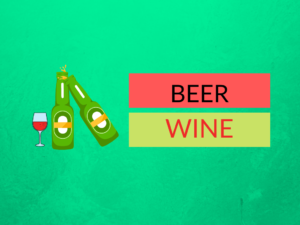The Difference Between Wine and Beer
When it comes to enjoying a drink, wine and beer are two of the most popular choices. Each has its own unique flavor and characteristics that appeal to different palates. In this article, we will explore the differences between wine and beer, from their ingredients and production processes to their uses and effects. So, grab a glass and let’s dive in!
What is Wine?
Wine is an alcoholic beverage typically made from fermented grapes or other fruits. The yeast consumes the sugar in the fruit and converts it into alcohol, resulting in the creation of wine. There are various types of wine available, including red wine, white wine, rosé, and sparkling wine. Each type has its own distinct flavor profile and is often paired with different kinds of food.
Examples of Wine
Some popular examples of wine include:
- Chardonnay
- Merlot
- Cabernet Sauvignon
- Pinot Noir
- Prosecco
- Champagne
Uses of Wine
Wine has been used for various purposes throughout history. Some common uses of wine include:
- Pairing with food
- Celebratory toasts
- Religious ceremonies
- As an ingredient in cooking
- Medical remedies (in moderation)
What is Beer?
Beer is a fermented alcoholic beverage made from cereal grains, such as barley, wheat, or corn. The grains are malted, meaning they are soaked in water and allowed to germinate, before being mashed and boiled with water. Hops are then added to the mixture for bitterness and flavor. Finally, yeast is introduced to ferment the sugars present in the liquid, resulting in the creation of beer.
Examples of Beer
Some well-known examples of beer include:
- Pale Ale
- India Pale Ale (IPA)
- Stout
- Pilsner
- Lager
- Wheat beer
Uses of Beer
Beer has been enjoyed for centuries and has various uses, including:
- Refreshing beverage
- Pairs well with a wide range of foods
- Socializing and gatherings
- Mixed with other ingredients in cocktails
- Used in religious ceremonies (e.g., Oktoberfest)
Differences Table
| Difference Area | Wine | Beer |
|---|---|---|
| Type of Fermentation | Fermented from fruit sugars | Fermented from grain sugars |
| Color Range | Red, white, rosé, sparkling | Variety of colors, but mostly amber |
| Alcohol Content | Generally around 12-15% | Varies between 4-8% |
| Production Time | Can take months or years | Can be brewed in a matter of weeks |
| Serving Temperature | Lower temperatures for most types | Cooler temperatures but not as cold as wine |
| Carbonation | Some wines are carbonated, but most are not | Carbonation is common |
| Taste | Flavors vary from dry to sweet | Flavors range from bitter to malty |
| Serving Glass | Specific glass shapes for different types | Standard pint glass or mug |
| Production Regions | Produced in vineyards around the world | Beer is brewed globally |
| Health Benefits | Moderate wine consumption may have heart-healthy benefits | Some studies suggest beer may have bone-strengthening properties |
Conclusion
In conclusion, wine and beer are both enjoyable alcoholic beverages with their own distinct characteristics. Wine is typically made from fermented grapes or fruits and offers a wide range of flavors, colors, and aromas. Beer, on the other hand, is brewed using various cereal grains and has a more expansive range of styles. The choice between wine and beer ultimately comes down to personal preference and the occasion.
People Also Ask
Here are some common questions that people may have about wine and beer:
1. Is wine stronger than beer?
No, wine is typically stronger than beer. However, it’s essential to note that alcohol content can vary significantly within both wine and beer, so it’s crucial to check the label for specific information.
2. Which is healthier: wine or beer?
Both wine and beer can be enjoyed as part of a balanced lifestyle. Moderate consumption of either can have potential health benefits, but excessive drinking of either can be detrimental to health.
3. Can I pair wine with beer?
While it’s not a common practice, there are instances where wine and beer can be paired together. It usually depends on the specific flavors and styles of the wine and beer being consumed.
4. Can I substitute wine for beer in recipes?
Yes, depending on the recipe, you can typically substitute wine for beer and vice versa. However, keep in mind that the flavors and characteristics of the dish may be altered.
5. How are wine and beer made?
As mentioned earlier, wine is made from fermented grapes or fruits, while beer is brewed using malted grains, water, hops, and yeast. The fermentation process for these beverages differs, resulting in their distinct flavors.


